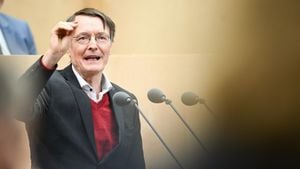South Korea is currently engulfed in a significant political crisis centered around the impeachment of former President Yoon Suk Yeol, which has ignited widespread concern both domestically and internationally. The turmoil stems from Yoon's controversial declaration of martial law on December 3, 2025, which is now under scrutiny as accusations of abuse of power emerge amid his administration's maneuvers to curb dissenting voices.
According to Oh Dong-woon, Director of South Korea's Corruption Investigation Office (CIO), the agency is preparing to compel Yoon to cooperate with investigations concerning the martial law declaration and subsequent actions taken against political leaders. Oh was quoted saying, "President Yoon must respect the court's decision... he refuses the summons, so we have no choice but to forcibly detain him." This indicates the heightened tensions surrounding Yoon's reluctance to engage with the legal proceedings initiated against him.
Yoon, who was detained on January 15, 2026, has remained defiant throughout the investigation phases, turning down multiple requests to answer questions posed by authorities. During questioning, which reportedly lasted over ten hours, Yoon maintained silence, raising alarms about the extent to which he is prepared to resist forthcoming legal demands. His current legal team has suggested they will contest any unlawful detainment, adding another layer of complexity to the proceedings.
During the hearings held recently, Yoon directly addressed the accusations, stating, "I never intended to enforce the decree and dissolve the National Assembly." He is also adamant about refuting persistent claims made by military officials who allege he ordered the arrests of parliamentarians to prevent opposition against his administration. His assertions highlight the severe rifts between his administration and the nation’s defense apparatus, which had reportedly acted under his directive.
This political debacle has not only precipitated Yoon’s legal troubles but has also triggered fears of destabilization across South Korea. Political analysts have raised alarms about the potential long-term effects on governance, public trust, and the functioning of the National Assembly. South Korea, often seen as one of the pillars of democracy within Asia, now grapples with questions of accountability and power dynamics, exacerbated by Yoon's tenure.
Yoon’s claim to legitimacy rests on the assertion of his martial law decision, which he argues was necessary amid rising turmoil and budgetary conflicts. Yet, the backlash against his claims reveals the growing anxiety from both citizens and political factions who interpret his actions as authoritarian maneuvers resembling tactics from less democratic regimes.
Widespread protests have erupted, with public sentiment leaning heavily toward demands for accountability and reform. Many view the current crisis as symptomatic of systemic issues within South Korean politics, where leaders often engage in power plays at the expense of democratic principles.
Notably, as investigations continue, the international arena is watching closely. There is mounting pressure from both domestic and global entities calling for transparency and adherence to democratic norms. The fear is palpable—what if South Korea's current predicament leads to even greater instability or influences its foreign relations, particularly with allies such as the United States who have vested interests amid rising tensions with North Korea?
The return of Donald Trump as the U.S. President on January 20, 2025, complicates the scenario even more for South Korea. Experts like Mason Richey from the Hankuk University for Foreign Studies express concerns about reduced U.S. support potentially affecting South Korea’s national security amid this crisis. Richey observes, "the conventional and nuclear deterrence capabilities of South Korea could be weakened... if the U.S. decides to lessen its backing." This potential shift complicates the already delicate geopolitics of East Asia, especially with North Korea’s ambition to solidify its alliance with China.
Despite the perilous political climate, Richey posits, negotiations between the U.S. and North Korea could be reignited, as Trump could see North Korea's alliance with China as detrimental and seek to exploit the current state of affairs. There is speculation surrounding possible provocations leading to brinksmanship—an increase in military exercises or demonstrations as both countries navigate through tense waters over Korea’s uncertain political future.
With Yoon facing the very real threat of impeachment alongside patriot unrest and international scrutiny, the stakes could not be higher. The unfinished business of the current administration’s legacy—predicated on governance, military action, and international relations—opens up discussions about accountability and rule of law, fundamental tenets of democracy.
The unprecedented nature of the situation is stark: South Korea, standing at the crossroads of history, must now wrestle with questions of leadership integrity, political resilience, and civic agency as it witnesses the unraveling of Yoon's presidency and the political crisis.
Moving forward, all eyes will remain focused on how this political saga plays out—for Yoon, the people of South Korea, and the broader international community invested in the region's stability.



